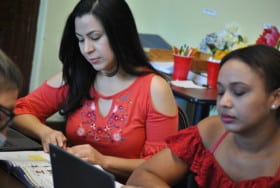Transforming the Future of Education #IDE2023
January 24th, 2023 | Blogs
This year, the UN’s International Day of Education is focused on ways that education needs to be transformed to guide the future of education initiatives.
Alongside the UN, we are committed to ensuring that every individual is guaranteed a high quality, contextualized education from an early age that establishes a foundation for lifelong learning, and provides opportunity and sustainability in a changing world.
Inclusive, Safe, and Healthy Schools
High quality learning can’t happen without an environment where everyone feels comfortable and welcomed. This means ensuring that school buildings are accessible and students have the assistive products they need, child safeguarding is in place to prevent violence against children, and young people are healthy to attend and remain in school.
Prioritizing Foundational Learning
Building foundational literacy and numeracy skills during early childhood requires appropriate curriculum and teaching materials, like phonics-based curriculum and decodable books, as well as standardized assessments to monitor learning progress. For students who are taught in languages other than their mother tongue, bilingual education can greatly improve learning outcomes by first building literacy skills in a language they already speak, and then transitioning to learning in the national language.

Sustainable Development through Education
Education is tied to various aspects of development, including health, the economy, and the environment. Education is a great tool for spreading messages about the climate and green living practices to establish sustainability and resiliency for the future. The Transforming Education Summit launched the Greening Education Partnership with the goal of ensuring learners gain knowledge, competencies, and attitudes to promote inclusive, sustainable development and tackle the environmental emergency.
Transforming Teacher Training
Transforming education means equipping teachers with the tools and skills they need. It’s important to make professional development opportunities available, as well as assess and revise teacher training curriculum to improve instruction. This includes training on pedagogical methods, digital skills, and gender and social inclusion, among others. For example, teachers of deaf students must continue to develop their sign language skills to best support learning.
A Digital Revolution in Education
Technology and education are increasingly interconnected. But, the positive impacts of using digital learning tools is limited by availability of internet, devices, and knowledge. Closing the digital divide, increasing connectivity, and providing digital skills training is crucial. Leveraging free, online open educational resources can transform the way students and teachers are prepared to engage with an increasingly digital world.

At the core of transforming education is designing, implementing, and evaluating education interventions with the governments, communities, and individuals who will be involved long-term. Technical assistance should align to country priorities and strengthen existing systems. We work to support governments and partners to achieve their goals, engage youth in transforming themselves and the wider society around them, and mobilize communities to invest in and advocate for education.
World Education fosters enduring partnerships across regions and sectors to advance education outcomes for all. We offer education systems strengthening, program design and implementation, applied research and evaluation, capacity development, and policy development services.